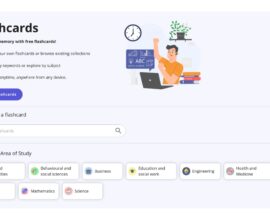Top 7 Key Steps for Effective Note-Taking
Note-taking in college can be intimidating. It can feel like you’re under severe time pressure to do two things at once—mentally process the information and jot it down quickly.
Effective note-taking techniques can help you retain new information and improve your active recall ability later on. Having good notes can also help you be more efficient and productive by allowing you to prioritise work and recall topics more quickly.
If you learn and utilise effective note-taking techniques early on, you will be able to take useful notes that will come in handy when studying for tests/exams or tackling assignments.
Good note-taking skills can also help you improve your focus, listening skills, comprehension of lecture content, and long-term retention of what you hear. These skills are crucial in a variety of courses and classes—since they help improve your capacity to actively listen to a speaker and boost your odds of remembering the specifics of a meeting, lecture, or assessment. As a result, you’ll be able to better comprehend and meet expectations when it comes to projects, coursework, assignments, presentations and more.
We’ve got you if you’re ready to nail your note-taking skills! This guide will show you how to prepare for taking good notes in class, introduce some effective note-taking methods, and cover the best writing tips to help you write faster. Read on below to see our list of 7 note-taking tips that you can use throughout your degree!
1. Prepare To Take Good Notes in Class
The first step in taking effective notes is to prepare ahead of time. It may seem pretty basic, but it is necessary to have certain things in order if you are to take better notes and make the most of your class time.
Here are some of the ways you can prepare before heading to class:
- Go through your reading assignments or familiarise yourself with the topic that will be covered in class. If you prepare, you will understand the lecture content better than if you didn’t
- Review your notes from the previous class
- Organise your note-taking materials—pencils/pens, ruler, brush pens, a notebook, sticky notes, highlighters, etc.
- Bring water and some healthy snacks with you
- Ensure you are in a great mood and have a positive attitude
2. Try Different Note-Taking Methods
Having a consistent structure to organise your notes is one of the best note-taking tips you should utilise right away.
There is no one size fits all note-taking method. You’ll need to experiment with different note-taking methods and stick to the one that works best for you.
To get you started, we’ve chosen some of the most common note-taking techniques for you to explore:
- Cornell method—With this most recommended note-taking method, you will divide each page into three sections:
- Cues: a narrow column to the left for the key concepts and questions
- Notes: a wider column to the right for your actual notes
- Summary: a brief section at the bottom of the page
You can fill up the cues and summary sections after class when revisiting your notes later.
- Outline method—You will identify a few key points that will be covered in the class, use them as your headings, and write detailed sub-points under them
- Charting Method—This note-taking method is ideal for organising topics that include many facts and relationships between various ideas. All you need to do is to divide each page into columns, label them, and fill out the details under each column
- Sentence Method—When using this technique, you’ll organise your notes by writing each new piece of information under a heading in sentence or point form
- Mapping method—This visual note-taking method works best for topics that are related to one another. You’ll start with a broad idea and then branch off to subtopics with in-depth information about each
3. Focus on the Main Points
At some point, most of us are guilty of attempting to jot down every word the professor says—which is both difficult and counterproductive.
How can you state everything word for word when the instructor speaks faster than you can write? You’d be devoting all of your working memory resources to transcription while postponing learning until later.
The key to taking better class notes is to strike a balance between understanding the topic and capturing what’s important. You can do that by paying attention, listening for the main ideas and key facts, and summarising what you hear in your own words.
This simple note-taking tip will not only help you take more effective notes, but it will also give you a deeper understanding of the topic and help you remember when you review them later.
4. Use Symbols and Abbreviations Where Appropriate
Accuracy and speed are critical when taking notes. If you don’t jot down the main points quickly, you might miss out on some valuable information.
That is why learning how to take effective notes includes using symbols and abbreviations. Arrows and other symbols will allow you to quickly represent relationships that would otherwise take more time to write out in full.
Just make sure to use shorthand code that you can easily remember when reviewing your notes later. Some strategies for this include using abbreviations and symbols consistently and keeping a list of the shorthand code you use so you can refer to them later.
5. Follow Your Instructor’s Pace
It’s possible to miss some information even if you pay attention in class and only scribble the main ideas. If you miss something, don’t waste time trying to check with your classmate, as you may fall behind even more.
Instead, switch concepts when your lecturer does. Leave some space where you can fill up the information later.
If you’re missing information due to distractions or because you can’t hear the lecturer clearly, try sitting in front during the next class.
6. Cite Any Sources the Lecturer Cites
Taking better notes in the class includes citing any sources your professor cites. Such sources may come in handy when you’re assigned a research paper or project which requires you to go deeper into the topic. It’ll also be easier to cite sources that your lecturer tacitly recommends.
It will also provide you with clues as to the concepts and sources that your professor finds important.
7. Follow Up on Your Notes After Class To Review What You’ve Learned
Good note-taking does not end in the classroom. You should revisit your class notes as soon as possible—preferably within a day or two.
Reviewing your notes will aid in long-term retention of what you’ve learned, prepare you for the next class, and provide you with more valuable notes to use when revising for exams or writing assignments. You can make it easier by including time for reviewing your notes in your study timetable.
When reviewing your notes, identify any gaps in your knowledge of the topic, summarise the information, check for clarity, ask questions, connect the new material to the course structure, reorganise anything that doesn’t make sense, and add any omitted details like facts and examples.
You can also consult reference materials or swap and compare notes with your classmates.
Summary
The rewards of cultivating effective note-taking skills are well worth the effort. You’ll no longer waste time and energy trying to make sense of wordy and/or jumbled notes. You also don’t have to sacrifice your comprehension of the subject trying to scribble down everything the professor says.
It’s worth trying out different note-taking methods until you find one that works for you. It’s a matter of trial and error, so be patient with yourself.
If you want to make the most of your notes after class and avoid cramming before exams, use study flashcards to test yourself. When you test yourself, you’ll figure out what you don’t know yet from your notes, and you’re less likely to forget the questions you get right. You can also utilise more study resources to help you study smarter and achieve better grades through our online learning app—Zookal Study!






